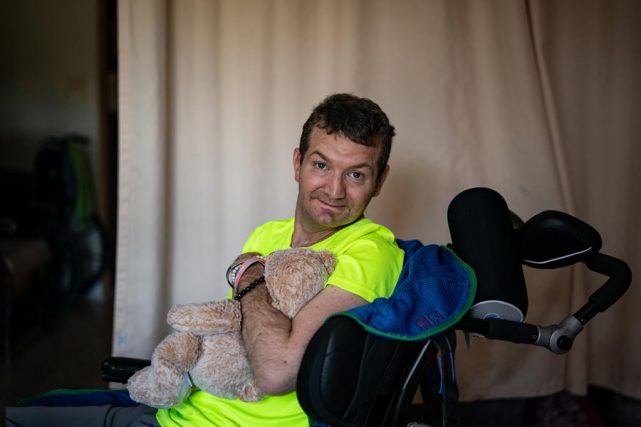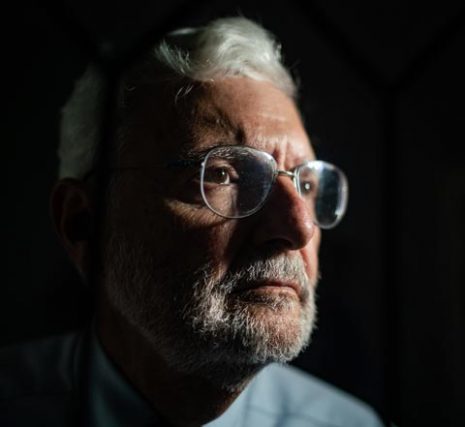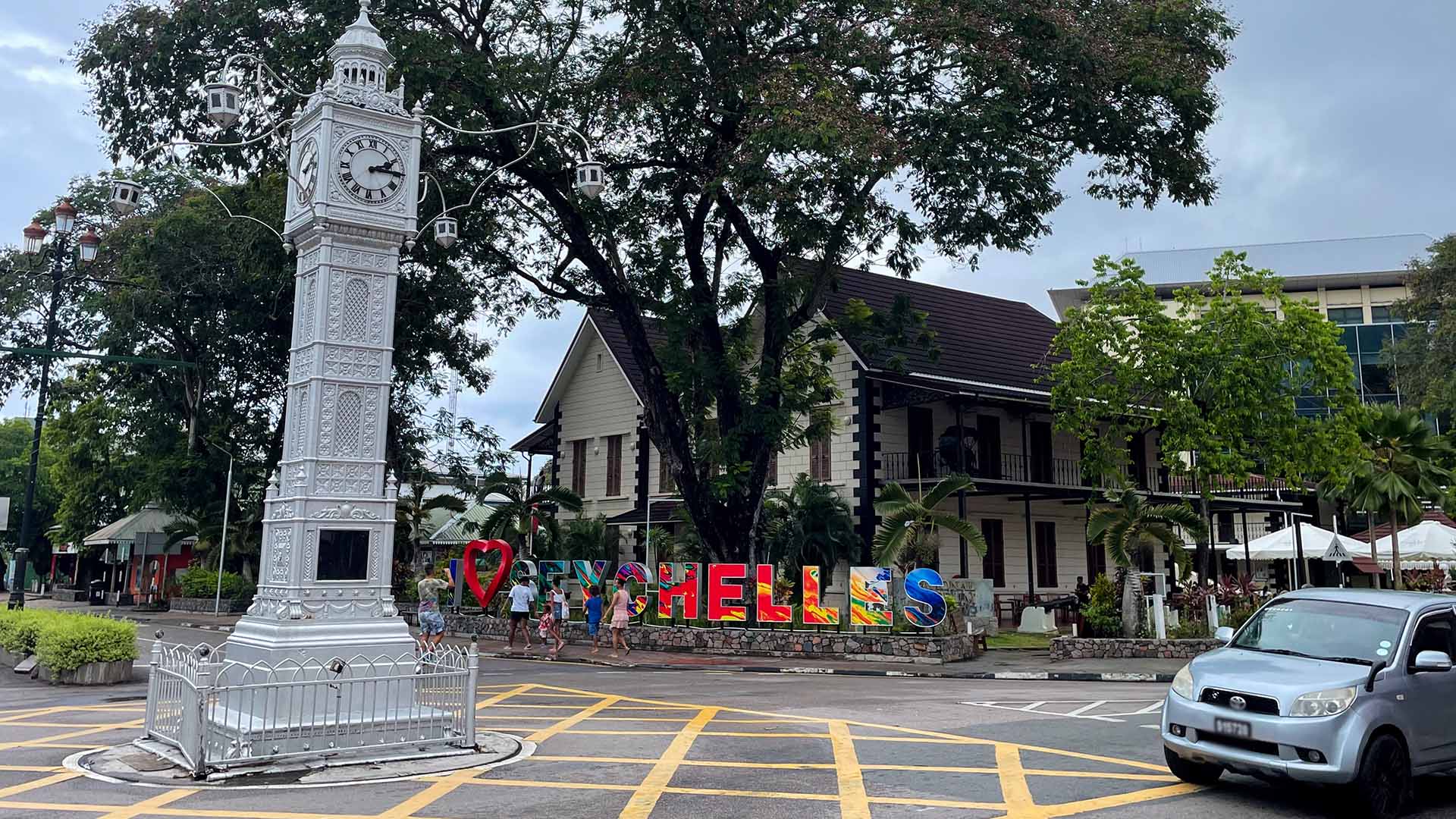BUTLER COUNTY, OHIO — The Pee Wee football coach lives in the same nursing home as his grandmother.
Mark Ryan, not yet 42, sits in a wheelchair, drinks from a sippy cup and gestures with the one arm he can still move freely. “I BELIEVE,” reads a plastic sign hooked to the top of a customized iPad his parents bought him early on, sometime after he settled into the sterile room with a stuffed bear and a relentless parade of sitcoms.
Ryan was an 18-year-old athlete when he went to Hollywood and 20 when he returned home, hooked on pain pills and alcohol, and too afraid to tell his parents what had happened to him and the other young men invited to extravagant Los Angeles parties hosted by entertainment executive Marc Collins-Rector.
Ryan and two others eventually sued, saying they had been drugged, threatened and raped by Collins-Rector and his associates in what would become one of the largest Hollywood sex abuse scandals of the 1990s. They won a multi-million-dollar default judgment from a California court – money that would have helped pay for the care Ryan needed after seizures and a stroke, brought on by an abrupt withdrawal from the alcohol and pills, forced him into the nursing home just after his 30th birthday.

Ryan never received the money from Collins-Rector.
In 2000, while under criminal investigation, Collins-Rector fled the country. He was captured in a beach resort in Spain and returned in 2003 to the United States, where he pleaded guilty to transporting minors across state lines to engage in criminal sexual activity but disputed the civil judgment against him. He left the country again in 2007 and has not been seen publicly in years.
What the Ryan family never knew – after searching for Collins-Rector and his money – was that the elusive sex offender moved some of his assets offshore to one of the world’s most notorious tax havens.
For a fee of $500, Collins-Rector set up a trust in the Central American country of Belize through a financial and corporate services firm that grew into a one-stop shop for American clients, including at least a dozen who sheltered assets while facing criminal investigations or costly lawsuits.
Robert Durst, convicted last month for the execution-style murder of a close friend in 2000, was a client. So was a mob accomplice, a dentist charged with defrauding Medicaid, a producer of adulterated drugs and the founder of a cruise company accused of negligence by the families of 31 sailors who drowned during a hurricane.
All were identified by The Washington Post and the International Consortium of Investigative Journalists through one of the largest-ever troves of secret financial documents, known as the Pandora Papers.
The documents expose how a prolific offshore operator in Belize accepted and served suspect American clients by setting up trusts and shell companies. The records also underscore the challenges faced by government investigators probing cases of fraud, tax evasion and corruption and the struggles of victims trying to find and claim money.
“Never got nothing, got zilch, nothing,” said Mark Ryan’s father, Fred, a retired steel company worker who declared bankruptcy in 2009 as his son’s medical bills piled up. “The people you are dealing with are millionaires. We just couldn’t fight it anymore.”
Collins-Rector could not be reached for comment. In 1999, court documents show, he paid $1 million to settle another lawsuit by a New Jersey man who said he was sexually abused as a child for years by the entertainment mogul. During his 2004 sentencing hearing in the criminal case, Collins-Rector told a federal judge, “I’d just like to say I’m very sorry, your honor. I’ve suffered. It doesn’t matter, but I’m very sorry. I don’t know what else to say at this point.”
In Belize, a former British colony, Collins-Rector and other Americans relied on the services of companies owned by Glenn Godfrey, a former attorney general, who helped write the country’s modern-day trust laws. Godfrey’s enterprises include a law office and the corporate services company known as CILTrust International Inc., formerly CitiTrust International Inc, which he owns with his wife.
Smart people get away with this all the friggin’ day … the systems that are in place are not designed to stop this flow of money. They’re simply not.– Paul Pelletier, former Justice Dept investigator
Federal prosecutors have identified Godfrey’s firms in court cases as offshore providers to Americans accused of wrongdoing.
One was Jared Wheat, convicted of selling adulterated and unapproved prescription drugs over the Internet through a Belizean company set up by CILTrust.
The other was billionaire Robert F. Smith, who evaded millions of dollars in U.S. taxes through a trust established at CILTrust. Smith settled with prosecutors last year and was not charged. In April, the Houston lawyer who arranged for the trust on Smith’s behalf was indicted for allegedly conspiring to defraud the United States.
The indictment referred to Godfrey’s firm 20 times, alleging that the lawyer, Carlos Kepke, helped Smith maintain a “false paper trail” to conceal assets from the IRS.
Neither Godfrey nor CILTrust has been charged with wrongdoing. Godfrey, 72, and his wife, Joy, did not respond to requests for comment.
Efforts to find and seize assets sheltered abroad are at times hamstrung by uncooperative providers of offshore services and by treaties on information sharing that can produce outdated or limited information, according to a dozen former prosecutors and investigators who spoke to The Post and ICIJ.
Some foreign governments are simply reluctant to help, they said.
“Smart people get away with this all the friggin’ day,” said Paul Pelletier, who spent more than 25 years working and overseeing financial crime investigations at the Justice Department. “Everybody thinks ‘Big, bad government.’… But the systems that are in place are not designed to stop this flow of money. They’re simply not.”
A Caribbean hideaway
The Pandora Papers’ documents, obtained by ICIJ and shared with The Post, reveal bank accounts, trusts, companies and foundations established by wealthy clients in the United States and abroad. The records come from 14 offshore providers, including CILTrust.

It is not illegal to set up an offshore entity to reduce taxes or manage wealth. For years, however, the secretive world of offshore finance has drawn international reproach for helping tax evaders and other criminals conceal assets from government investigators and victims seeking restitution through lawsuits.
The documents do not often make clear why the Americans sheltered their assets offshore or whether their money was generated from criminal activity. In most of the cases identified by The Post and ICIJ, offshore trusts and companies were created or active at a pivotal time: when prosecutors and investigators were bearing down or lawsuits were looming.
One of the most common destinations for American clients among the 14 providers was Belize, an English-speaking nation about a 2 ½- hour flight from Miami. The tourist-friendly country has drawn less scrutiny than other global financial hubs, but the United States has included Belize on a list of “major money laundering” jurisdictions every year for more than a decade.
A team of financial experts in the Caribbean faulted Belize’s financial crime watchdog unit in 2011 for being vulnerable to external pressure and for having “severe resource constraints.”
Belize has few restrictions on foreign ownership of companies, and experts say anti-corruption laws are poorly enforced.
“I often refer to it as the Wild West – it’s every man for himself,” said Cynthia Pitts, vice president of the country’s Human Rights Commission and one of the longest-serving public officials in Belize. “We used to scoff at these countries around us as banana republics. But … we are worse than them.”
The Government of Belize did not respond to requests for comment.
Godfrey’s CILTrust is housed inside his Belize City law firm, in a four-story building on a narrow street of ramshackle houses and crumbling concrete storefronts. Outside, fruit vendors sell bananas and watermelon. A fast-food restaurant advertises tortillas, known as “salbutes” – five for a dollar. Godfrey’s initials, GDG, dominate the building’s facade, along with the flag of Finland, a nod to Godfrey’s position as the Nordic nation’s honorary consul in Belize.
Founded in 1994 as Cititrust International Inc., CILTrust for years promoted its services to wealthy foreigners. “If a man doesn’t want to pay his taxes,” Godfrey said, according to Wired magazine in 2000, “that’s not a crime against humanity. That’s between him and his government.”
Godfrey was in a good position to draw business: In the 1990s, he had served as Belize’s attorney general, the minister of tourism and environment, a member of the country’s National Assembly. His wife, Joy, a managing director of the firm, is a former national director of tourism.
Glenn Godfrey was also a close advisor to Prime Minister Said Musa, who left office in 2008. Musa was criminally charged that year with theft in connection with $10 million earmarked for housing projects. The Belize Supreme Court later dismissed the case, citing insufficient evidence.
In one fax to Musa, part of the cache of documents, Godfrey offered the prime minister advice on how to respond to an unnamed interviewer who was probing the country’s offshore banking system.
“Belize has more modern international financial services legislation than the Cayman[s] and most other international financial services jurisdictions,” Godfrey wrote to Musa. “… There has not been a single documented instance of money laundering in Belize.”
In a competitive industry, the Godfreys appeared to thrive.
A 2004 list of Joy Godfrey’s assets, found in the documents, described six properties, including a seaside villa with sprawling gardens in one of Belize City’s gated communities. She also listed a condominium in Houston.
CILTrust at that time was overseeing more than $200 million of trust assets for its clients, including Americans under investigation at home, the documents show.
One undated customer log identifies Collins-Rector as well as tax evader David R. Hinkson, convicted in Idaho in 2005 of soliciting the murders of a federal prosecutor, a judge and an IRS agent. The log also identifies Martin Zarcadoolas, who pleaded guilty in 2000 to helping the Colombo crime family with its South Florida operation, and recently convicted murderer Durst.
Several were named in media accounts when they approached CILTrust to establish trusts or modify existing ones.
When Durst set up a trust in 2003, he was in custody for another case, awaiting trial on a charge of murder in the disapperance of a neighbor in Texas. His lawyer at the time wrote to CILTrust, advising that Durst was seeking to hold a $1 million life insurance policy for his second wife in the trust and that the asset was unrelated to the “alleged offense at issue in Mr. Durst’s upcoming trial,” the records show.
Durst was acquitted of murder later that year after arguing he shot his neighbor in self-defense. He pleaded guilty to evidence tampering, admitting that he had dismembered the body and dumped it in Galveston Bay.
The Pandora Papers records show the trust remained active at least until 2007, when CILTrust asked Durst’s lawyer about unpaid fees.
Durst has long been suspected in the 1982 disappearance of his first wife, but was never charged. Through his attorney, Durst declined to comment.
Hinkson, who is serving a life sentence in federal prison in North Carolina, said by phone that he was a “political prisoner” who never evaded taxes or solicited murder. He said he met Godfrey at a conference in Las Vegas and established a trust to own a ranch in Idaho.
“I became an expert on asset protection, not to hide money but to hide assets,” he said. “When I started becoming a millionaire, people kept suing me. All those lawsuits were based on garbage.”
Zarcadoolas did not to a request for comment.
The Belize pill factory
Offshore firms such as CILTrust generally provide routine administrative services from faraway locations that many clients may never see. Godfrey, however, played a more extensive role in the early career and legal travails of an American pill maker who has been accused by U.S. authorities of deceptive advertising, illegal manufacturing practices and money laundering.
Jared Wheat, imprisoned twice as a teenager for distributing ecstasy and then violating probation, created Hi-Tech Pharmaceuticals in Georgia in 1998. After the federal government warned that Hi-Tech was distributing an unregulated weight-loss drug with “false and misleading” labeling, Wheat approached Godfrey.
Through CILTrust, Wheat set up companies in Belize. He also opened an account in 2001 at a Belizean bank where the Godfreys were shareholders and advisers, according to Pandora Papers documents.
On his bank application, the records show, Wheat, then 29, listed expected annual deposits ranging from $100,000 to $30 million and attributed the income to“pharmaceutical and dietary supplement sales throughout the world.” His company’s address in the United States was in a mall across from a Waffle House about 20 miles north of Atlanta.
In 2004, Wheat set up in a seven-room bungalow in what Belize referred to as its export processing zone. The land, near Mayan ruins, was partly owned by Joy Godfrey, according to the documents.
In July, Belizean police and agents with the U.S. Drug Enforcement Administration raided the house, finding a pill-counting machine and hundreds of thousands of pills, according to a description of the raid and other reports found in the documents.
“Labeling and packaging of these products, which were not done in a professional manner … could have caused serious harm,” Sharon Sanchez Anderson, chief pharmacist at Belize’s Ministry of Health, said in a statement to police as the investigation unfolded.
In Belize, Wheat was charged with money laundering in connection to the drug operation. He retained Godfrey as a defense lawyer and was later acquitted.
A federal grand jury in Georgia indicted Wheat’s company, Wheat and 10 others in 2006, alleging that they illegally sold unapproved drugs over the internet.
Prosecutors said in a court filing that one of Wheat’s attorneys claimed that Wheat’s decision to flee Belize in July 2004 and later transfer $1.7 million to Panama was “upon advice of his attorney, Glenn Godfrey.”
Prosecutors also described a police affidavit that said Godfrey, whose company ran the export zone where Wheat’s operation was located, had the electricity turned off during the execution of a search warrant, forcing investigators to suspend the search. Godfrey told police that Wheat’s company had an overdue electric bill of $809.
“It is perhaps more than coincidental that Mr. Godfrey’s company … shut off the power,” prosecutors said.
In 2009, a federal judge in Georgia sentenced Wheat to 50 months in prison for illegally selling knock-off prescription drugs online, fined Wheat $50,000 and ordered the company and other defendants to forfeit $3 million in proceeds.
In a new case in 2017, a federal grand jury in Georgia indicted Wheat for wire fraud, money laundering and other offenses. Godfrey’s name came up again, this time after a federal agent found his alleged signature on an audit report that claimed a dietary supplement sold by Wheat’s company had met U.S. safety standards.
In a court filing, the agent said there was no reason to believe Godfrey worked as an auditor. Godfrey has not been accused of wrongdoing in connection with the case, which is ongoing.
Wheat, who last year posted an Instagram video of his new Lamborghini, declined through his lawyer to comment. He has previously defended his company and said the operation in Belize complied with U.S. law.
“Hi-Tech manufactures, sells, and distributes millions of dollars of lawful dietary supplements,” Wheat said in a 2018 court filing.
In pursuit of answers
As Godfrey’s client list grew, foreign governments repeatedly asked for the financial records of suspect clients.
From 2002 to 2018, the Pandora Papers documents show, countries including the United States, Russia, Ukraine, Spain, Belgium and Austria submitted more than 100 requests for information to help crack criminal cases. The requests were mostly routed through the Belize Financial Intelligence Unit, which forwarded them to Godfrey’s companies.
The records do not always make clear how CILTrust responded to the requests.
In one case in 2011, CILTrust was asked for information about the owner of Jarvis Trading Ltd., a shell company set up by CILTrust that was implicated in a money laundering case in Ukraine. In its reply to Belize’s Financial Intelligence Unit, CILTrust instead named the company’s “nominee director,” a front person often used to obscure the true owner of a company.
The records show the owner of Jarvis Trading Ltd. was Serhiy Melnyk, an associate of Ukrainian oligarch Ihor Kolomoisky. Melnyk has been linked by Ukrainian media to Kolomoisky’s companies, which U.S. authorities suspect of money laundering.
Kolomoisky has denied wrongdoing and has not been charged. Neither he nor Melnyk responded to requests for comment.
At least seven requests to CILTrust came from state and federal authorities in the U.S., including one 2007 inquiry from the FBI, which was investigating a case of suspected money laundering.
Somebody could set himself up in some country and just put out a sign and say, ‘Come to me if you want services that allow you to hide assets from your government,’ and there’s nothing we can do about it – Former federal prosecutor Stefan Cassella
Agents wanted to know more about the shell company Sunroad Investment Corp., set up by CILTrust, including whether products were being shipped to the company.
CILTrust told Belizean authorities that it did not have the relevant information on file. The Justice Department asked again two years later, according to leaked records. It is unclear whether the matter was resolved.
In 2018, the Justice Department asked for financial records, ownership information, letters and other correspondence related to a 2000 trust established by CILTrust for technology investor Smith.
Prosecutors alleged that Smith illegally set up the trusts to hide assets from the IRS.
In a statement that appears in the documents, Godfrey disclosed to the U.S. government that he had worked with Houston attorney Kepke to help Smith set up the trust. Godfrey, according to his statement, said he met Kepke in the mid-1990s at an asset protection conference in Houston.
Kepke and CILTrust also helped create two Belizean trusts for Smith’s financial backer and mentor, the Texas software billionaire Robert T. Brockman, the records show. In 2020, Brockman was indicted in what authorities describe as the largest tax fraud in U.S. history. Brockman pleaded not guilty; the case is ongoing.
In his 2018 statement, Godfrey told U.S. prosecutors that he ended his firm’s relationship with Smith in 2009 – nine years earlier.
“Cititrust was very concerned that it was in [the] dark as to what exactly Mr. Kepke and Mr. Smith were doing with assets,” Godfrey wrote.
Smith last year agreed to pay $139 million in fines and penalties and is cooperating with prosecutors. In April, a grand jury indicted Kepke.
Kepke did not respond to a request for comment for this article. Smith declined to comment. “I should never have put myself in this situation,” Smith wrote in a letter to investors last year.
Godfrey has stayed active in recent years, the secret documents show, receiving payments from clients, signing an application to open a new corporate bank account and meeting in 2018 with a Texas business owner who had apparently failed to pay taxes.
The U.S. government can seek to penalize offshore providers. Prosecutors in 2018 indicted an attorney and an asset manager in Panama who allegedly helped create shell companies for Americans hiding their assets.
“The charges announced today demonstrate our commitment to prosecute professionals who facilitate financial crime across international borders and the tax cheats who utilize their services,” Assistant Attorney General Brian A. Benczkowski said at the time.

Some former prosecutors and investigators, however, say U.S. officials have at times been reluctant to push harder against foreign governments and offshore firms, fearing diplomatic pushback among allied nations.
“Somebody could set himself up in some country and just put out a sign and say, ‘Come to me if you want services that allow you to hide assets from your government,’ and there’s nothing we can do about it,” said former federal prosecutor Stefan Cassella, who spent 30 years at the Justice Department investigating money laundering. “Everybody thinks the Justice Department has unlimited powers, except for people who have worked in the Justice Department.”
One of the problems, former prosecutors said, is information-sharing agreements between the United States and other countries. Though some countries quickly respond to information requests like those sent to Belize, others wait months or years to provide information through a mutual legal assistance treaty.
“It takes forever to draft. It takes forever to get it approved…it takes even longer to get a response and even longer to get a response that actually provides substance,” said former federal prosecutor Evelyn Sheehan, who helped oversee asset forfeiture and financial investigations in the Justice Department and is now in private practice in Miami.
Pelletier, the former DOJ prosecutor, said even when information comes in, it may not be complete. “There’s no transparency into the responses of some countries,” he said. “Belize, Panama, you don’t know what you’re getting and what you’re not getting. You don’t know when they’re lying and when they’re not lying.”
The Justice Department said that prosecutors have other, informal ways of requesting information from abroad and that the agency has devoted more resources in recent years to improving the treaty process, which helps secure authenticated evidence.
“The Department of Justice is committed to investigating and prosecuting individuals and entities who use offshore structures to launder money from the United States and obscure their wealth,” said spokesperson Nicole Navas Oxman. “While we recognize the challenges posed by the procedural requirements inherent to the [treaty] process, we will continue to work with our foreign counterparts to investigate schemes spanning international jurisdictions, find and seize ill-gotten gains and seek to forfeit them including by encouraging those counterparts to respond promptly to our [treaty] requests.”
Life follows fiction
At his Cincinnati-area home flying an American flag, Fred Ryan tries not to think about the man he considers responsible for breaking his son.
“There were nights that I just got my guns, threw them in the truck and left, started driving to [California] and not telling anybody.”
He ultimately turned around and went home. “There was something inside of me that kept saying no. I think that was God.”
In 2001, a California judge issued the default judgment against Collins-Rector and other defendants in Ryan’s civil case. One of the defendants later settled. Collins-Rector fought the judgment, arguing that he wasn’t notified about the case because he was living in Spain, and never paid.
The Pandora Papers records show he established his Belizean trust about 18 months before the judgment. The trust owned a shell company that appears to have been established in the Caribbean island of Nevis, considered one of the world’s most secretive tax havens. The records do not provide the company owner’s name or information about assets.
Prosecutors say criminals often “layer” shell companies and trusts in multiple jurisdictions to further conceal their assets.
In 2002, Collins-Rector was captured in the south of Spain with machetes and child pornography in his possession. The following year, he was extradited to the United States.
He pleaded guilty in 2004 to criminal charges brought by prosecutors in New Jersey and California. He received credit for time that he had spent in jail in Spain while awaiting extradition, paid a fine and registered as a sex offender. He left the country again after receiving permission from a judge to seek treatment abroad for a brain tumor.
Prosecutors involved in the criminal case noted in court that the government suspected Collins-Rector had “significant offshore accounts.” The secret files show the Collins-Rector trust in Belize became inactive in 2006.
In 2011, a California court renewed the outstanding judgment against Collins-Rector, whom a media report last placed in Europe. By then, Ryan, who had been coaching Pee Wee football with his father in Ohio and trying to stay clean, was confined to a nursing home.
After years of addiction that began in California, he abruptly stopped drinking and taking pills, his father said. In sudden withdrawal, Mark Ryan’s body broke down, suffering multiple seizures and strokes. He fell into a coma for several months.
He can no longer walk, talk or feed himself. He lost some of his teeth during a seizure.
He now lives one floor above his 88-year-old grandmother, who stays in the nursing home’s dementia unit. Going out to swim would help with rehabilitation, but his wheelchair is too unwieldy for the family van and Fred Ryan does not have the money to buy a bigger one.
In 2019, a court once again renewed the default judgment. With interest, Ryan and the two other plaintiffs are now owed $10.8 million.
On most days, Fred Ryan lingers over pictures of his son, who started playing football in elementary school in the 1980s.
About the same time in Belize, Godfrey published a novel. He called it: “The Sinners’ Bossanova,” a reference to Latin American music and dance.
In the book, a wealthy foreign whiskey smuggler faces execution for illegally selling diesel fuel to Nazis off the coast of Belize during World War II. An attorney, along with a Belizean friend, help the smuggler hide his assets in case of arrest.
“You work hard … for the things you own,” the friend says. “It’s better you do something to protect it than to make the government take it, no?”
Alice Crites and Shawn Mulcahy of The Washington Post, Jesús Escudero at ICIJ and Tanya Kozyreva in Ukraine contributed to this report.




